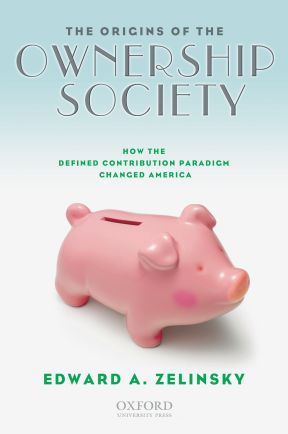Edward A. Zelinsky is the Morris and Annie Trachman Professor of Law at the Benjamin N. Cardozo School of Law of Yeshiva University. He is the author of The Origins of the Ownership Society: How The Defined Contribution Paradigm Changed America. In this article, he criticizes proposals for the states to administer private sector retirement savings plans. Read his past OUPblog posts here.
Legislators throughout the country are proposing that states start to administer private sector retirement savings plans. While the details of these proposals vary from state to state, they all provide that the states should embark upon the business of managing private sector individual account arrangements.
In Connecticut, for example, the state senate, before recently adjourning, passed S.B. 652 which would have created a state-sponsored “universal 401(k).” This legislation would have mandated the state’s comptroller to establish and administer a state-run “tax-qualified defined contribution retirement program” for the self-employed, the tax-exempt institutions, and the “small employers” of the Nutmeg State.
On  the other side of the country, currently pending in the California legislature is AB 2940. If enacted, this legislation would authorize CalPERS, the Golden State’s public pension plan, to accept from California residents payroll deposits for state-administered individual retirement accounts. Similar legislation has been introduced in a variety of other states.
the other side of the country, currently pending in the California legislature is AB 2940. If enacted, this legislation would authorize CalPERS, the Golden State’s public pension plan, to accept from California residents payroll deposits for state-administered individual retirement accounts. Similar legislation has been introduced in a variety of other states.
The concern animating all these proposals is well-founded. The defined contribution paradigm has worked well for many American households, in particular, middle- and upper-middle families who save and invest through 401(k) plans and IRAs as well as the employees of large employers which sponsor and typically match such employees’ 401(k) contributions. Despite this success, it is troubling that lower-income workers and smaller employers are severely underrepresented in the individual account system.
This problem, however, has deeper roots than is acknowledged by the advocates of state-administered private sector retirement plans. The current retirement savings system relies heavily on the income tax benefits of contributing to tax-qualified arrangements such as 401(k) accounts and IRAs. Those tax benefits are substantial for middle class and more affluent workers who defer significant federal income taxation through their tax deductible contributions to such accounts.
However, low income workers today do not pay significant federal income taxes. They thus have little, if any, tax motivation to make 401(k) or IRA contributions. A deductible contribution is not a meaningful incentive for someone in a low or zero tax bracket. This would remain the case even if states compete with the private sector suppliers of retirement plans. A low-income worker who derives no tax benefit from a deductible IRA contribution at his neighborhood bank will similarly derive no tax benefit from contributing to an IRA administered by his state’s comptroller.
Moreover, even if they want to make such retirement savings contributions, most low-income workers lack the discretionary income to do so.
The private market for retirement savings products is broad and deep. Today, every reader of a major newspaper or of the internet is bombarded by the advertising of the financial services industry, selling 401(k) plans and IRAs. There is no market failure requiring state-provided retirement savings for the private sector.
There is, furthermore, an unintended irony in the idea that the states should ride to the rescue of the private retirement system. The states can’t keep in order in their own pension systems. The states’ underfunding of their own pension plans is today a serious problem. There is something untoward about states which cannot solve their own pension difficulties purporting to act as the saviors of the private sector retirement system.
There is an important step the states can take if they are serious about encouraging 401(k) and IRA participation among low-income individuals. In particular, the states could, in their own income taxes, match part or all of the federal savers’ tax credit which subsidizes the retirement saving of low-income persons by providing a tax credit if a low-income worker contributes to an IRA or 401(k) account.
However, there is no compelling case for the states to enter the private retirement savings business. Let them put their own pensions on solid financial footings first.
ShareThis
Saturday is World Aids Day. We asked authors Gerald M. Oppenheimer and Ronald Bayer to help us commemorate this important holiday, to help us remember why AIDS research, awareness and education is so very important to our society. Oppenheimer and Bayer are the authors of Shattered Dreams: An Oral History of the South African AIDS Epidemic which uses interviews to tell the story of how physicians and nurses in South Africa struggled to ride the tiger of the world’s most catastrophic AIDS epidemic. In the original article below they reflect on the progress made and work still to be accomplished.
Once again it is almost World AIDS Day and in cities and communities around the world, there will be commemorations marking the date, December 1. But this year may be different. Some will begin to say, as they did in the United States, “Enough!” Too much energy, too many resources, have been devoted to an epidemic whose dimensions may have been exaggerated. They will point to a recent report from the United Nations suggesting that the global burden of HIV have been overestimated. Instead of the approximately 39 million people, as the world body previously reported, it is now thought that the numbers are closer to 33 million individuals. The number of newly infected, said the report, is declining where it is not leveling off. Seizing on these numbers, we will be urged to breathe a collective sigh of relief. (more…)
Share This




